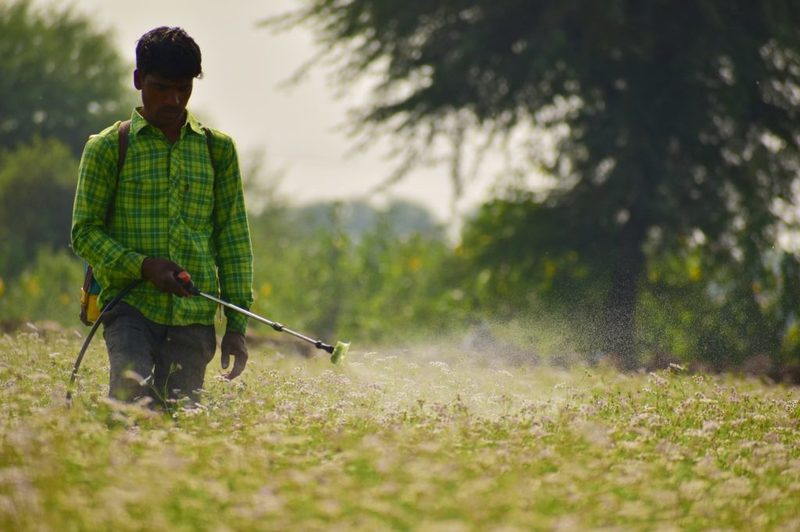If there’s pest control going on nearby, you’ll want to know how to reduce exposure when others use pesticides. Let’s just say that pandemics aren’t the only uses for personal protective equipment or PPEs as they can keep you safe during pesticide application.
You’ll also have to be on the lookout for well-ventilated areas away from target areas. Read on to find out more.

How Do You Protect Yourself From Exposure?
The first parts of your body that get in contact with pesticides are your skin and your eyes possibly afterward. This is where PPEs come in.
When someone uses pesticide in the surrounding areas, ensure that you’re wearing clothes long enough to cover as much of your body as possible. Nonabsorbent gloves, closed rubber footwear, and goggles can keep your hands, feet and eyes protected respectively.
Goggles are especially important if you wear contacts. Contact lenses can trap chemicals and affect your eyes so either use goggles as previously mentioned or remove your contacts.
Another health and safety concern is the inhalation of chemicals. If you’re around when someone is applying pesticide, make sure you wear a mask to filter out the chemicals or fumes.
Some pest control products have PPE instructions on the label, so this emphasizes the importance of following pesticide instructions before application.
When a person is mixing or diluting pesticides, stay away from the area to avoid inhalation or contact with skin. Also worth mentioning is ensuring the person doing the mixing is either outdoors or in a well-ventilated area.
It’s also very important to let the person applying pesticides use proper amounts as specified on the label. It can go without saying that overuse increases the risk of exposure and does more harm than good and obviously won’t increase effectiveness.
How To Store Pesticide
When others apply pesticides, it’s important to ensure that they store the products properly.
It’s essential to ensure that people purchasing pesticides buy only the needed amount to lessen the risk of exposure or leaks.
They should also store pesticides in a locked cabinet that are out of reach from children or pets. Pesticide containers will usually have storage instructions printed on the label so it’s important to follow them.
You should also ensure that no-one places pesticides near medicine, toiletries, or food to lessen the risk of contamination.
These precautions also apply to equipment used in pest control. Keeping the equipment stored away safely also reduces the risks of exposure.
Also worth mentioning is that one shouldn’t keep pesticides in random containers such as empty bottles. See to it that you or anyone who applied pesticide stores it in its original container.
Don’t forget to seal the containers tightly. For more information on proper pesticide storage, especially industrial pesticides, here’s a helpful article on what is the right way to store pest control chemicals.
How To Safely Dispose Of Pesticides
Due to the chemicals in pesticide formulation, proper disposal is necessary to avoid contamination or exposure.
Accidental spills may also be a concern, so let’s go over that first. If you or someone else accidentally spills pesticide, do not simply wipe it away.
Instead, sprinkle the spilled area with vermiculite, kitty litter, or sawdust. Then, sweep it all into a garbage bag and follow pesticide disposal protocols.
When it comes to tools you or someone else used for pest control, place them in a bucket and rinse thoroughly. Pour the rinse into a pesticide sprayer and apply it to the earlier targeted areas.
It’s important to emphasize that you should never dispose of pesticide down the drain, in the toilet, or the sewers.
Pouring pesticides down the drain can cause serious consequences as many treatment plants can’t properly filter out pesticides. Thus, pesticides could contaminate waterways and pose health hazards to living organisms.
If you were nearby during pesticide applications, you’ll have to wash any parts of your body that were likely exposed to the chemicals.
Regarding exposed clothing, it’s worth noting that you shouldn’t mix contaminated clothes with the rest of your laundry. After you separate the clothes, wash them immediately along with washable PPEs.
You should also let the person washing the clothes and PPEs know the proper procedures in handling and cleaning them safely.
If the clothes are heavily drenched or contaminated with pesticides, the best option is to dispose of them altogether. Simply place them in a plastic bag and dispose of them in outdoor garbage.
If you need to know more about properly disposing of pesticide containers, we’ve got a handy guide on how to dispose pesticide containers after pest control.
Conclusion
Well, there you have it. Now you know all there is to know about how to reduce exposure when others use pesticides.
There are a lot of safety protocols to follow due to the strong chemicals present in pesticide products. Still, in doing pest control, the health and safety of the people in the surrounding area are of utmost importance.
Pest control can get complicated, but it’ll be worth it to manage pests in your area.
